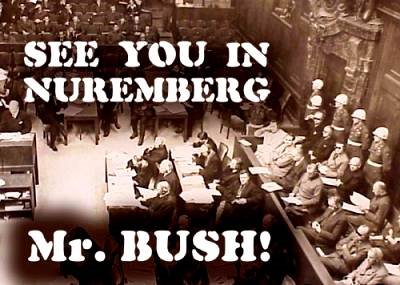Expressed views by Haifa Zangana.

The rhythm of death
On December 7 Tony Benn and others wrote to the UN and attorney general asking them to investigate breaches of the Nuremberg charter and the Geneva convention in Iraq.
Was it yesterday or the day before? At 2pm, in Parliament Square, a few metres away from Brian’s homage to the plight of Iraqi people under sanctions, war and occupation we were. Twenty men and women. Writers, filmmakers, activists, two Iraqi academics, two MPs, people from Arab satellite TV and David Wilson, Stop the War press officer.
Behind us there was a banner, a painting. A combination of a vertical section of Guernica with the word Falluja written on. An integral whole. A unified condemnation of two barbaric acts. George Steer, an eye witness to the first act wrote a report, which was published in the Times on April 28 1937. Here is an excerpt under the subtitle, Rhythm of Death:
It is impossible to state yet the number of victims. In the Bilbao Press this morning they were reported as "fortunately small" but it is feared that this was an understatement in order not to alarm the large refugee population of Bilbao. In the hospital of Josfinas, which was one of the first places bombed, all the 42 wounded militiamen it sheltered were killed outright. In a street leading downhill from the Casa de Juntas I saw a place where 50 people, nearly all women and children, are said to have been trapped in an air raid refuge under a mass of burning wreckage. Many were killed in the fields, and altogether the deaths may run into hundreds. An elderly priest named Aronategui was killed by a bomb while rescuing children from a burning house.
================
Death of a professor
There is now a systematic campaign to assassinate Iraqis who speak out against the occupation
In a letter to a friend in Europe, Abdul Razaq al-Na’as, a Baghdad university professor in his 50s, grieved for his killed friends and colleagues. His letter concluded: "I wonder who is next!" He was. On January 28 al-Na’as drove from his office at Baghdad University. Two cars blocked his, and gunmen opened fire, killing him instantly.
Al-Na’as is not the first academic to be killed in the mayhem of the "new Iraq". Hundreds of academics and scientists have met this fate since the March 2003 invasion. Baghdad universities alone have mourned the killing of over 80 members of staff. The minister of education stated recently that during 2005, 296 members of education staff were killed and 133 wounded. (...)
===============
So much for illusions
Despite the election, ordinary Iraqis face a daily struggle to survive attacks, kidnappings and killings
Behind the facade of post-election political process, despite Tony Blair’s desire to move on and George Bush’s attempt to mend fences with Europe, in Iraq the atrocities continue to mount. Some, like the Hilla attack, are Zarqawi-style, with hundreds dead and wounded. Others are more mundane and sustained, like US warplanes bombing suspect houses in Ramadi, Hit, or Mosul, roadblock killings in Najaff, or post-curfew hunting by snipers in Sammara.
Despite all the rhetoric about "building a new democracy", daily life for most Iraqis is still a struggle for survival, with human rights abuses engulfing them. A typical Iraqi day begins with the struggle to get the basics: petrol, a cylinder of gas, fresh water, food and medication. It ends with a sigh of relief: Alhamdu ilah (thanks, God), for surviving death threats, violent attacks, kidnappings and killings. (...)
==============
What drives the fighters in flip-flops

Falluja is not unique. Collective punishment is escalating in Iraq
In a statement that directly echoed George Bush, Qasim Daoud, Iraq’s interim minister of state for national security, told a news conference at the weekend: "Mission accomplished... Falluja has been liberated". He proudly recited the list of the dead - 1,400 terrorists, foreigners and Saddamists. And what about civilians, the women and children trapped in the fighting zone.
Any casualties? He avoided the question. (...)
============
Iraqis have lived this lie before
The British transfer of sovereignty in the 20s was equally meaningless
In Iraq, we have an expression: same donkey, different saddle. Iraq’s long-heralded interim government has now formally assumed sovereignty. Official labels and tags have duly changed.
The US administrator will now be an ambassador, while Sheikh Ghazi al Yawar and Iyad Allawi, US-appointed members of the former governing council, are to be known as president and prime minister.
To formalise the change, the UN has already issued a resolution under which "multinational forces" will replace "US-led forces". On the issue of control over US troops, the message is clear: the US forces are there to stay only because "Iraqi people" has asked them to. But which Iraqi people? Do they mean the new administration headed by the CIA’s Iyad Allawi? And why does all this sound strangely familiar?
Link Here
Alliance For Security - The British Occupation of Iraq
The British Occupation of Iraq. "Our armies do not come into your cities and lands as conquerors or enemies but as liberators" ...

British Colonialism and Repression in Iraq
Britain set up a colonial regime in Iraq after a long military campaign during World War I. In response to Iraqi resistance, including a country-wide uprising in 1920, British forces battled for over a decade to pacify the country, using airplanes, armored cars, firebombs and mustard gas. Air attacks were used to shock and awe, to teach obedience and to force the collection of taxes. Winston Churchill, as responsible cabinet minister in the early years, saw Iraq as an experiment in high-technology colonial control. Though officials in London sometimes had qualms about the violence, colonial administrators on the ground like Gertrude Bell expressed enthusiasm for the power of the imperial military enterprise.
Lessons To Be Learned:Iraqi Resistance to BritishOccupation 80 Years Ago
by Hussein Askary
In Iraq, as in many other places, history keeps repeating itself, sometimes with all the ironies and paradoxes of war and peace. In the view of this Iraqi author, the situation there, due to the foolish policy of the Bush Administration and the wicked plans of the war party of Cheney and his neo-conservative cronies, is moving rapidly towards a major confrontation all over the country. This most likely will recapitulate the 1920 Iraqi revolt against the British Empire. The resistance to the U.S. occupation in Iraq recently has been relatively limited to the so-called "Sunni triangle," in the capital and north and northwest of Baghdad. However, there is an increasing pattern of dismay and calls for confrontation among the Shi'ites in Baghdad and southern Iraq.
The Shi'a Muslims, who make up 65% of the 24 million Iraqi population, have been passively watching developments while politically organizing their communities around religious institutions. The Shi'ites, like the Kurds, have suffered enormously under Saddam Hussein's dictatorship. Ironically, most of the resistance to the U.S.-British invasion of Iraq in March-April this year took place in the south. Were the Shi'a defending Saddam Hussein? The answer is, of course, no. >>>cont
Link Here




0 Comments:
Post a Comment
<< Home